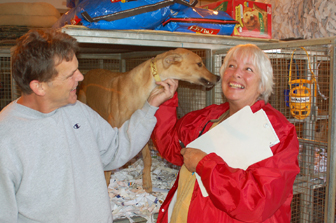A
ship in harbor is safe — but that is not what ships are for.
— John A. Shedd
I know, Question 3 is about prohibiting dog racing, not sailboat
racing. But the above quote came to mind as I watched the Salem
News-sponsored debate on that ballot question.
Chip
Ford [his photo below; click on it to enlarge] and I were there because he was arguing for "Yes on 1" and I
was trying to decide about Question 2. I thought I had already made
up my mind to vote for Question 3 because I'm an "animal nut" who
always votes yes on animal rights issues.
But as I
watched proponent Christine Dorchak accusing greyhound owner and
trainer John O'Donnell of inhumane treatment, I began to wonder: Why
would people who had invested in a dog to win races mistreat him in
ways that would prevent his maximum performance?
I
appreciate animal rights activists in general, and if the greyhounds
were being abused, I wouldn't care if abolishing racing costs jobs.
But are they?
I read
the voter information booklet, noted that dogs are sometimes injured
while racing. The little quote about the sailboat kept returning and
transforming itself: A greyhound who doesn't run won't be injured,
but what are greyhounds for?
Dogs
have always been bred for a particular reason, and that is what they
do: Border collies herd, hounds and spaniels hunt, other dogs guard,
protect, rescue, perform at shows, and pull sleds across miles of
snow. Greyhounds run.
Later I
learned that in fact they chase. They are what dog experts call
"sight hounds" as opposed to dogs that hunt by scent. I'm told this
is why they don't go out without a leash: they will chase any
running creature without regard to their safety. But when nothing is
running, they are happy to just lie around; they sleep a lot, like
cats.
I
wondered: If greyhounds could vote, how would they vote on Question
3? So Chip and I went to John O'Donnell's kennels to ask them.
We got
there just as one large group was coming in from playtime. They
rushed the fence we stood behind, pushing to be noticed. As
O'Donnell opened the doors to the stacked cages, each dog walked or
leapt into the one with his name on it.
For
sure, cages make me uncomfortable, but I have friends who keep their
pet dogs in crates; though I'd never do that with my own, I'm
getting used to it. I'm told that some dogs are den animals and like
having their own secure space. Dogs are pack animals and the
greyhounds seem to like hanging out near other dogs.
Each
cage has the dog's official racing name, though their muzzles (worn
while they play so they don't nip another short-haired dog) carry
their pet names (Glitter, Meatball, Renee, Mosquito); John and
kennel manager Casey O'Neil seem to know them all.
I was
surprised by the wide variety of colors and personalities: I'd
expected more inbred uniformity. Some cages had a number — the ideal
racing and health weight — controlled by weighing the food, which
looked good enough to share. The dogs ate politely, and seemed
friendly and unintimidated.
I was
asked if I'd ever seen a dog smile. Well, yes; my golden retriever,
shepherd mix and Newfoundland all smiled a lot. But greyhounds have
slim, tight mouths.
O'Donnell introduced me to Danielle and told her to "smile." Her
attempt made her look like a skinny Hound of the Baskervilles, about
to rip out my throat. She licked my neck instead.
John and
Casey were laughing; they said they've never had another dog that
"smiled" like Danielle. I wanted to bring her home.
Fortunately she didn't have "Pet" on her cage. The dogs who have
that note are ready to be "petted out," and the men told me that
they have
a waiting list of people who are being vetted for
ownership.
O'Donnell takes pride in finding homes for his dogs no matter where
they end their racing days.
I
learned that it is illegal in Massachusetts to euthanize a greyhound
until a reasonable effort is made to place them for adoption, and
that effort seems successful because many people want these gentle,
retired "athletes," as the trainers call them. This makes them more
protected than shelter animals. Credit for this goes to activists
like Question 3 proponents, whose efforts in the past encouraged
strong state regulation.
Of
course, there are only so many homes for pets, so one can argue
against making more puppies who will someday compete with the many
homeless dogs. That argument could be used about goldens and Newfies
too, though. If not for racing, would this amazing breed — the
second fastest animal on earth — be eventually lost?
Honored
as hunters and pets by ancient Egyptians and British royalty, the
greyhound was brought to America in the late 1800s to help
Midwestern farmers control the crop-eating jackrabbit; coursing
events soon followed.
Official
racing may be in decline already; with the many protections built
into Massachusetts regulations, I can't bring myself to vote to
end it now. Run, chase and smile, Danielle.
The comments made
and opinions expressed in her columns are those of Barbara Anderson's
and do not necessarily reflect those of Citizens for Limited Taxation.